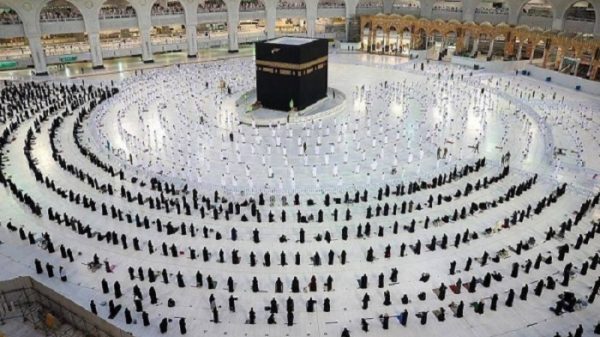Saudi King orders to shorten Taraweeh prayers at Two Holy Mosques

- Update Time : Monday, April 12, 2021
- 117 Time View

Saudi Arabia’s King Salman bin Abdul Aziz on Sunday ordered to shorten Taraweeh prayers (special night prayers) at the Grand Mosque in Mecca and the Prophet’s Mosque in Medina to 10 Rakat during Ramadan, state news agency (SPA) said.
Sheikh Abdul Rahman Al Sudais, head of the Presidency for the Affairs of the Two Holy Mosques, said that the Taraweeh prayers will be shortened to 10 Rakat, instead of 20 Rakat, and that will be strictly in compliance with the precautionary measures and preventive protocols, prepared by the presidency and other relevant agencies involved in serving the pilgrims and ensuring their safety from coronavirus.
Sheikh Al Sudais highlighted the Saudi leadership’s keenness to continue facilitating the performance of rituals at the Two Holy Mosques by mobilizing all means to enable the pilgrims to perform their rituals in a safe and healthy environment that meets all global health standards used in the fields of infection control.
“King Salman and Crown Prince Mohammed bin Salman are continuously following up on everything that would provide the best services for the pilgrims and worshipers during the unprecedented season. The presidency has equipped its full human and mechanical capabilities to serve pilgrims and worshipers during Ramadan in cooperation with all parties involved in serving the guests of God,” he said.
Earlier, Saudi authorities allowed performance of Umrah and prayers at the Two Holy Mosques during the holy month, which is expected to start on Tuesday, but suspended the ritual of i’tikaf (spiritual seclusion) and iftar meal at the holy mosques.
Only vaccinated and immunised pilgrims and worshipers will be allowed to perform the rituals of Umrah and prayers at the two mosques, where children will not be allowed to accompany pilgrims and worshipers. The Isha prayer permit will include performance of Taraweeh prayers as well.
During last Ramadan, not only Umrah but also five daily obligatory prayers, Taraweeh prayers, and iftar meals were suspended for the domestic and foreign pilgrims at all mosques following the outbreak of the pandemic in March 2020.
During this Ramadan, the capacity of the Grand Mosque has been raised to accommodate up to 50,000 vaccinated Umrah pilgrims and 100,000 worshipers.















